Your New New Year’s Resolution: Register Your Copyrights!
Happy 2015 everyone! I hope your new year’s celebrations were festive and suitably rejuvenating because, friends, it’s time to get back to work.
And you’re gonna start by registering your copyrights.
If you read this blog or have heard me give interviews you’ll know that I think copyright is a magical thing.
You create an original work that is fixed in a tangible medium of expression and PRESTO! you’re the proud owner of your very own copyright.
The copyright means that you have the exclusive right to use your original work. You can make copies of it, distribute it, display or perform it publicly, and make whole new works based on it. You. No one else. If someone wants to do one of those things with your work, they’ll need your permission.
(This doesn’t apply to works made for hire or to fair uses of your work. Follow the links to learn more.)
You get all of those rights for free, immediately upon creation. You don’t have to do anything to get those rights; you just have them as the creator of the original work.
Like I said: magical.
So what’s the benefit in registering your copyright?
Dolla$
Dolla$ Reason #1: If you register your copyright within three months of the first time you publish the work, you’re eligible for something called “statutory damages” if someone infringes your work. Statutory damages are damages dictated by statute, in this case the U.S. Copyright Act, and are an alternative to suing to collect the actual money you lost because of the infringement. Since statutory damages can range from $200 to $150,000 per infringement, they’re nice if you can get ’em.
Dolla$ Reason #2: If you register your copyright within three months of publication OR before your work is infringed you can ask the court to make the infringer (a.k.a. “not you”) pay your attorney’s fees if you win the lawsuit. Since attorneys’ fees for a copyright lawsuit can easily trip into the 6 or 7 figures arena, being able to pass the bill along to the person who stole your stuff is really nice.
Dolla$ Reason #3: If you register your copyright before someone infringes your work, the registration will be prima facie evidence that you’re the real copyright owner. That means you won’t have to waste time and money in court proving that you’re the real copyright owner, and therefore entitled to exclusive control over your work. The court will accept that you’re the rightful copyright owner unless there’s evidence that proves otherwise.
So how do you register your copyright and avail yourself of these financial benefits?
Point your browser toward copyright.gov.
This is the Copyright Office’s website. Right there on the front page is (left, middle-ish) a nice lady registering her copyright from her personal computer in the comfort of her own home. To follow her good example and click on her picture.
If you’ve never registered a copyright before you’ll need to create an account. Once you have, enter your username and password. You’ll see the following screen once you log in.
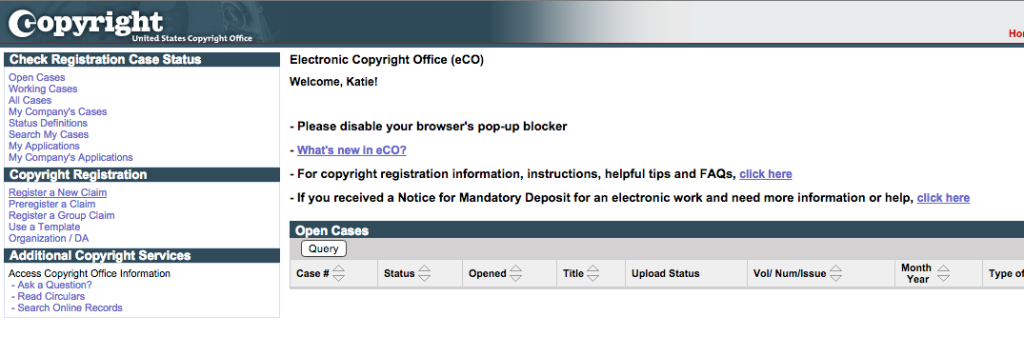
Very 1998, no?
Let’s say you’re registering a comic book. The book is a collection of 20 strips you created last year about the six months you spent as a ranch hand on an alpaca farm. Because you were on the farm for such a long time you never got around to putting these strips up on your website, but you think they’ll make a nice chap book that you can sell at Emerald City Comicon.
The first thing you’ll see once you click “Register a New Claim” is this page:
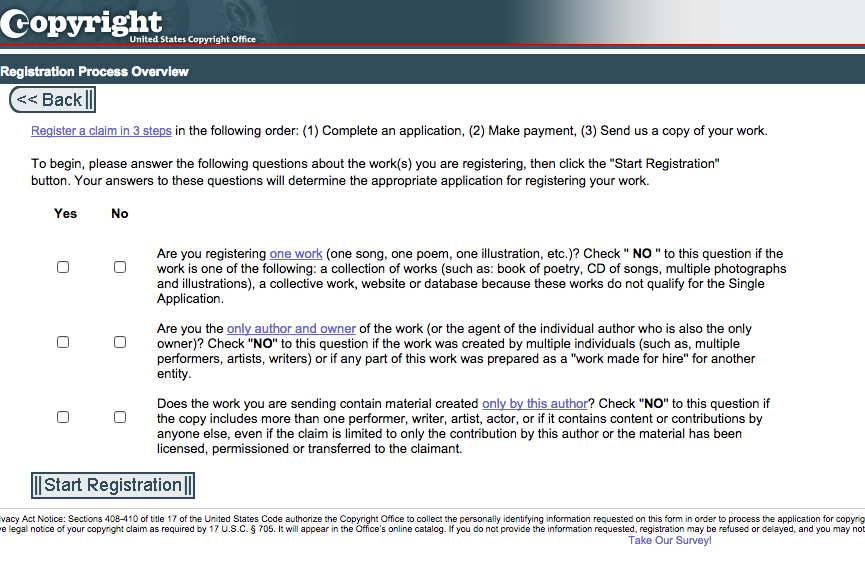
Since your chapbook, “Alpaca, My Packa” is a collection of individual strips, it’s probably not one work. But you are the only author and owner of the work and the work only includes things you’ve created. Your buddy Dylan offered to do some alpaca fan art for the chapbook (she’s got a lot) but you declined the offer.
The next thing you’ll be asked once you start the registration is what kind of work you’re registering.
With comics this is can be a puzzle. The Copyright Office’s circular says that comics and cartoons can be registered as either literary works (TX) or works of visual art (VA). Which do you choose?
My advice? Go with whatever primarily drives the story.
And if that advice doesn’t help, poke around of the in the registration database (copyright.gov –> Search Records) and see how other authors with work similar to yours registered their work.
You decide that “Alpaca, My Packa” has many great qualities, but its primary storytelling happens through its text. You pick TX.
You’ll be asked to provide some details about the work such as when you first created it and what its first publication date is. Since you aren’t planning on publishing this collection of strips anywhere before ECCC, you decide to make the first date of the con the publication date.
When you enter your information as the author, the next screen will ask you what you’re claiming as yours. It’s asking you this because these are the things you’ll be able to claim ownership of should someone misuse the work in the future (also, if any of it’s not yours, you don’t want to accidentally claim it). There are helpful “Help” links next to each area you can claim if you aren’t sure.
For “Alpaca, My Packa” you decided to check “Text, Editing, Artwork and Compilation.”
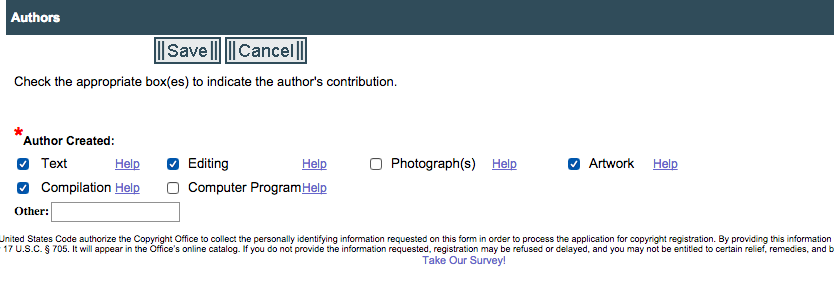
Once you’ve added in your name and address about four different times (pro tip: click the “Add Me” button) you’ll be asked to review your application. Do This Thing. If you goof up you’ll likely have to pay additional fees to correct the mistake.
Once you’re sure everything is a-OK, you can submit the application. You’ll be asked to pay the registration fee (in this case $55, here is full list of the Copyright Office’s fees) and submit a copy of the work. Since “Alpaca, My Packa” is unpublished you can do this electronically (if it were published they want the best quality physical copy you got because you’re gonna be in the Library of Congress, baby!).
Once the Copyright Office has processed your application, assuming there aren’t any questions or errors, they’ll send you a registration certificate. Which you will try to act cool about getting but not-so-secretly you’ll be thrilled.
New Year’s Resolution: complete! Congratulations!
For those of you wanting to learn more about how copyrights work and how you can protect them, Kiffanie Stahle, attorney and founder of the artist’s J.D., has a new e-book out about what to do if someone steals your copyrighted content online. I was a beta reader for the book and was impressed by how thorough and helpful it was. Plus, it’s got a great title: “Eep! Someone’s Stolen My Content! How to calmly handle the situation and the tools to take care of it.” The book’s on sale until January 19th.
Categories: The Rest

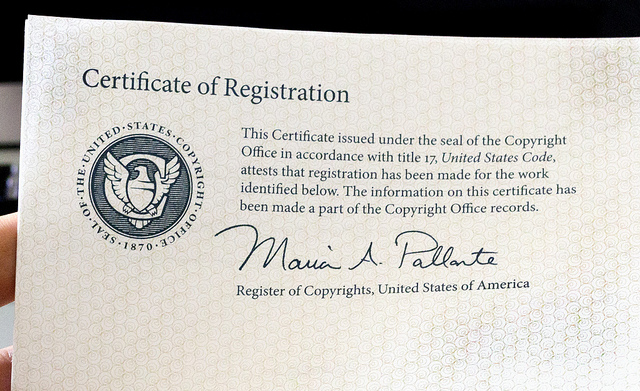
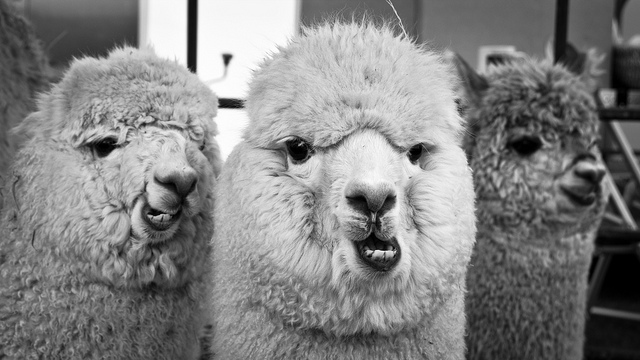


~50 bucks *each* is rough for affordability if you’re trying to protect prolific content (Say, 5 paintings, 15 illustrations, and 1 comic book). An idea I had considered was making a “collection” every month or 3 and registering that, but I don’t know if that would work quite right if someone stole an individual piece.
Yeah, the basic registration fee just went up to $55 from $35 recently. Registrations of “one work” (one illustration, one painting) are still only $35. You make a good point though that the copyright registration for “Alpaca, My Packa” would be for the book as a whole, not for each individual strip. That doesn’t make the copyright interest in the individual strips go away, it just means they aren’t registered. FWIW, the Copyright Office also has processes for registering series and websites; just didn’t have space to touch on them here.
I have a question. I got a comic book, created by myself. I am a foreigner living in South Korea. I want to register the copyrights of my comic book. I do not speak Korean language and finding an attorney here is (very) difficult. Can I use the method you suggested or, since I am in Korea, should I register it following local rules? I a very lost. Please help!
Hi Thadrio,
This post is only for copyright registration in the United States. I don’t how best to handle that sort of situation in South Korea and I’m not familiar with resources I can point you toward. Sorry I can’t be of more help!
Best,
Katie
[…] paying for4, has a New Year’s resolution for you, with a handy walkthrough to make good: how to register your copyrights and why you should bother. Bottom line: you’re even more protected with a formally-registered copyright than an implied […]